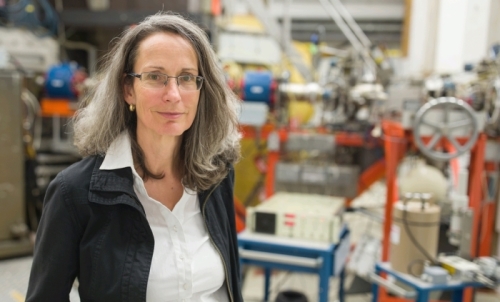Andrea Denker is Professor of "Accelerator Physics for Medicine"

Prof. Dr. Andrea Denker is the head of the department "Proton Therapy" at HZB. © HZB/ M. Setzpfandt
The Beuth Hochschule für Technik Berlin and the Helmholtz-Zentrum Berlin (HZB) have appointed Prof. Dr. Andrea Denker to the joint professorship "Accelerator Physics for Medicine" as of October 1, 2018. Since 2006, Andrea Denker is head of the department "Proton Therapy" at the HZB, which operates the accelerator for eye tumor therapy. The therapy, offered in cooperation with the Charité - Universitätsmedizin Berlin and the HZB, is unique in Germany.
As part of her professorship, Andrea Denker is taking on lectures in the "Physical Technology - Medical Physics" course at Beuth University. In the current winter semester she offers the lecture "Atomic and Nuclear Physics" for Bachelor students.
Even before her appointment, Andrea Denker was a lecturer at the university. "I enjoy this job very much and the contact with the students is very enriching for me and my team at HZB," says Denker. The appointment now creates an even closer connection to the university. "We are already looking forward to many interesting theses that will be written at the proton accelerator at the HZB.
Andrea Denker studied and received her doctorate in physics at the University of Stuttgart. Then she worked at the CSNSM (Centre de Sciences Nucléaires et de Sciences de la Matière) in Orsay, France. In 1995 Andrea Denker started as a scientist at the ion accelerator ISL. Among other things, she calculated and developed the beam parameters for eye tumor therapy, which was launched 20 years ago.
(sz)
https://www.helmholtz-berlin.de/pubbin/news_seite?nid=14955;sprache=en
- Copy link
-
AI re-examines dinosaur footprints
For decades, paleontologists have pondered over mysterious three-toed dinosaur footprints. Were they left by fierce carnivores, gentle plant-eaters, or even early birds? Now, an international team has used artificial intelligence to tackle the problem—creating a free app that readily lets anyone decipher the past.
-
The twisted nanotubes that tell a story
In collaboration with scientists in Germany, EPFL researchers have demonstrated that the spiral geometry of tiny, twisted magnetic tubes can be leveraged to transmit data based on quasiparticles called magnons, rather than electrons.
-
Bright prospects for tin perovskite solar cells
Perovskite solar cells are widely regarded as the next generation photovoltaic technology. However, they are not yet stable enough in the long term for widespread commercial use. One reason for this is migrating ions, which cause degradation of the semiconducting material over time. A team from HZB and the University of Potsdam has now investigated the ion density in four different, widely used perovskite compounds and discovered significant differences. Tin perovskite semiconductors produced with an alternative solvent had a particular low ion density — only one tenth that of lead perovskite semiconductors. This suggests that tin-based perovskites could be used to make solar cells that are not only really environmentally friendly but also very stable.
